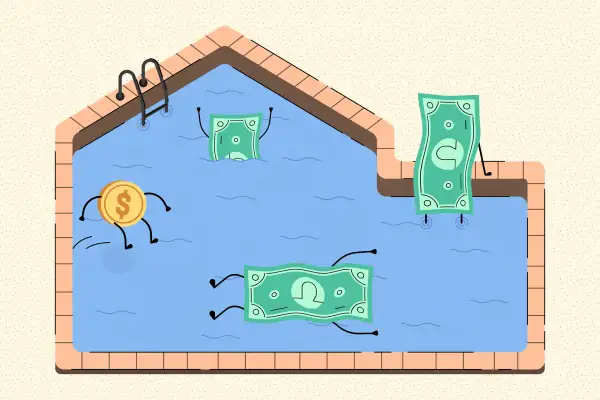6 Ways Your Home Can Make Money for You (No Sale Required)

If you’re a little short on cash or just thinking about ways to make some extra money, look no further than your home.
We’re not talking about selling or adding to your expenses by taking out a home equity loan, either. After all, you worked hard to be able to round up a down payment and, if you bought recently, braved a super-hot housing market and probably had to outbid multiple buyers.
Instead, you can find innovative ways to make your house and property work for you. We’ve highlighted six businesses you can run from your home — literally. Some don’t take a lot of time or money, while others may require permits or investing in home improvements.
1. Rent out your pool or backyard
Have a backyard pool you rarely use? Why not rent it out and make some extra cash?
People renting the space get access to a private area where they can exercise, celebrate birthdays or test out underwater gear. For owners, renting out your pool can help offset the costs of maintaining a pool — or much more.
A company called Swimply will help you become a host and get your information out to potential guests. They can help you market your pool, set a price and vet guests.
The earnings potential will depend on your location, the type of pool and extra amenities you may offer. Hourly rental rates start at $35 and can go up to$200 or more for a pool with a hot tub and other perks. Last year, hosts on the platform earned an average of $10,000 to $20,000, with some hosts earning over $100,000.
2. Become an Airbnb Host
Airbnb is perhaps the best known option on our list. It’s a platform that allows you to list a second home, a backyard guest house or a spare room to guests per night. You get to decide how often and when you want to open your home.
Nationally, Airbnb hosts earn an average of about $29,000 per year, with some hosts earning much more. How much you could earn will depend on your location and the type of space you have available. Renting a single room inside your home with shared facilities may not bring in as much as a finished basement with its own entrance, bathroom and kitchen or an entire home.
3. Share your home
With rents nationwide increasing at a double-digit pace, renting out unused living space can be a great source of extra income. The national average rent for a two-bedroom unit is $1,997, which is income that can offset part or all of your mortgage payments or add to your emergency fund.
You don’t need to own a second home to become a landlord. A finished basement with a separate entrance, a tiny home or an accessory dwelling unit built in your backyard can be turned into a rental suite or independent home.
You can also take in a housemate in exchange for monthly rent, with common areas of the home shared. Linda G. was looking for ways to supplement her income when she ran across Silvernest, a company that matches older homeowners with housemates and assists in setting up a lease or home sharing arrangement. The arrangement has worked well for her beyond providing extra money.
“I’m able to get help with homeowner tasks,” says Linda, who lives in Denver. “I get the comfort of knowing someone is in the home when my housemate is not working.” The average homeowner can earn about $10,000 per year, according to Silvernest.
4. Store other peoples' stuff
People tend to have a lot of stuff but sometimes don’t have enough space to store it in.
“One of the cheapest and easiest ways to rent out your space for extra money is by offering storage space,” says Leonard Ang, CEO of iPropertyManagement Leasing in San Diego. “Garages can be extra valuable here if you can offer seasonal storage for vehicles like boats, motorcycles, campers and convertibles.”
You can turn an extra closet or spare room in your house into storage for smaller items like clothes or furniture. Make sure to make a detailed inventory of what’s being stored in your home with the owner to avoid potential disputes in the future. You use a listing site like SpareFoot.com or StoreAtMyHouse.com to advertise your space.
Ang notes that how much you can charge for storage space will vary by volume. Closet space may go for about $5 to $10 per month while a basement or garage could go for $100 or more, especially if the space is temperature-controlled.
5. Make your home a star
Have a spectacular kitchen worthy of a famous chef? A stately home reminiscent of a bygone era? Consider renting it out for photo shoots, commercials, movie productions or private parties.
This is what Alex M. and her husband have done with their Los Angeles home, advertising it on a site called Peerspace. They’ve played host to everything from social campaigns from Anheuser-Busch to commercials for Care.com and Coors Light.
How much you can earn will depend on your location, the style of your home and the needs of the production company, but Alex estimates that a homeowner could earn between $50,000 and $100,000 per year, depending on how active they are in renting out space.
“We have a super renovated, ultra-bright/white kitchen so it works for a ton of different brands,” she says. “If you have a more ‘unique’ house the pricing structure might be different, or you might not book as much.”
6. Rent out a parking spot
In some cities, parking space is limited. You can make extra cash by renting out your unused spot to a neighbor, student or office worker looking to have a dependable and safe area to park their car.
When she lived near the University of Georgia, Briana Knight Leonhard rented out the unused portion of a long gravel driveway to campers and RV’s. She estimates that she made $500 a month during college football season.
You can advertise your parking spot on sites like Craigslist or use one of a number of specialized sites like Neighbor or Spacer. According to these sites, you can make as much as $200 to $500 per month renting out your parking, depending on your location and whether it’s an indoor or outdoor spot.
What you need to know before starting
Before embarking on any type of venture, there are a couple of things you should be aware of.
Check local laws
If you’re considering adding a rental unit to your home or renting out a spare room, check your local zoning regulations to make sure it’s legal. Also, check the landlord-tenant laws in your city and state.
Some cities have restrictions on home-sharing sites like Airbnb. These restrictions can include limits on the number of units that can be rented, establishing a maximum number of days a unit can be rented per year, requiring city permits or licenses and requiring that the property be a primary residence.
If you’re building a tiny home or ADU, check in with your local building permits department to learn the requirements for obtaining a permit and ensure your build is up to code whether you intend to rent it out or not.
You’re going to need insurance
You already have homeowners insurance, but your current coverage likely won’t extend to damages caused by paying guests.
If you’re renting out your home for activities, you’ll need insurance to cover damages or loss caused to your property, but you may also need liability insurance to protect you in case a guest is injured while on the premises.
You’ll want to get landlord insurance if you’re renting a room or separate living space. This typically covers the rental structure, legal or medical expenses associated with your property and loss of rental income in case of damages requiring repairs.
Check with a knowledgeable insurance agent about what type of coverage you might need based on how you're using your home.
Make sure the benefit outweighs the cost
You should consider all these activities as a business venture, no matter how small they may be. That means you have to be willing and able to deal with customers and tenants, serve as a host or be a property manager. Make sure you’re up for the task.
If you’re thinking of adding a rental unit to your home, consider the costs of building or renovating the necessary space. The cost of adding a tiny home averages between $30,000 and $60,000, while adding a single room studio ADU averages $30,000 (although larger models that include full bedrooms, kitchen and bathroom can cost as much as $250,000).
Compare costs to how much income you can realistically pull in and see how long it will take you to recover your investment. You don’t want to get in over your head financially and find you’re losing money instead of making it.
More from Money:
This Summer's Hottest Moneymaker? Renting out Your Swimming Pool
These Vacation Towns Are Limiting the Number of People Who Can Rent Their Houses as Airbnbs
For These Millennial Homeowners, the Vacation House Is the New Starter Home

